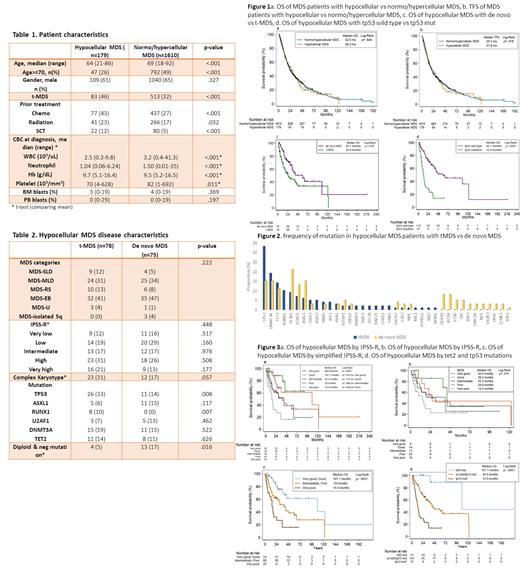Abstract
Background : Hypocellular myelodysplastic syndrome(MDS) is a distinct subset of MDS. It is defined as cellularity less than 30% in patients' age ≤70, or less than 20% in patients' age>70. More studies suggest that hypocellular MDS has distinct biology and clinical characteristics. Here we investigated clinical, pathological characteristics of patients with hypocellular MDS and their outcome.
Methods : Patients with newly diagnosed MDS from January 2010 to June 2021 at the University of Texas MD Anderson Cancer Center were retrospectively reviewed. Patient and disease characteristics were collected to compare between hypocellular MDS and normo-/hypercellular MDS groups. Further detailed analysis focusing on patients who were investigated 28-gene or 81-gene mutation panels were conducted including de novo MDS and therapy-related MDS(t-MDS). Survival data for detailed analysis was updated in July 2021, and multivariate analyses were conducted with step-wise selection(p-value cutoff 0.10). IPSS-R was used to confirm risk stratification in hypocellular MDS patients.
Results : Out of 1,789 newly diagnosed MDS patients, 179 patients were identified as hypocellular MDS. Hypocellular MDS patients present with lower CBC counts(p<.0001). More t-MDS were identified in hypocellular MDS group (n=83, 46%) compared to normo/hypercellular MDS group (n=513, 32%), (p< .001). Other baseline characteristics were comparable between hypocellular MDS patients and normo/hypercellular MDS patients (Table 1). There was no difference in overall survival (OS)(median 25.3 months vs 22.5 months, respectively, Figure 1a) or transformation-free survival(TFS)(Figure 1b) between hypocellular MDS group and normo/hypercellular MDS group (HR in OS for hypocellular MDS patients : 1.05, 95% CI 0.86-1.29, p=.645). Hypocellularity did not affect survival outcome in t-MDS (p=.420) or de novo MDS (p=.745).
A total number of 153 hypocellular MDS patients were available for 28- or 81-gene panels. 78 patients (51%) had t-MDS. They presented with lower Hb (p= 0.045) and platelets (p=.016) than de novo MDS patients at diagnosis. Treatment history was similar; 54% of t-MDS patients were treated with HMA compared to 56% patients of de novo MDS with HMA treatment(p=.870). t-MDS patients had frequent TP53 (33% vs 15%, p=.008) and RUNX1 mutation(10% vs 0%, p=.007)(Figure 2). AML transformation rates of t-MDS(29%) were similar to that of de novo MDS (20%, p=.313). t-MDS has shorter median survival at 24.8 months compared with de novo MDS at 60.1 months (p= .018) (HR 1.75 in OS for t-MDS, 95% CI 1.09-2.81, p=.020). 17 patients were diploid without mutation, which includes 5% of t-MDS patients and 17% of de novo MDS patients. Median survival was longer at 60.1 months in those patients without significance(p=.479). Multivariate models for OS selected t-MDS, TP53, TET2 and Age 70. IPSS-R risk group of very low and low, intermediate and high were not well separated(Figure 3a), especially in t-MDS patients(Figure 3b). However, simplified mode of IPSS-R into very low, low vs. intermediate, high vs. very high has good prediction of survival including t-MDS and de novo MDS(Figure 3c). Patients with TP53 mutation had worse survival and TET2 mutation had better survival distinctively, compared to patients without those mutations(Figure 3d).
Conclusion : Hypocellular MDS patients did not have survival difference compared to rest of MDS patients. These patients present with lower blood counts, and more frequently having t-MDS. t-MDS patients with hypocellularity tend to have high risk mutations of TP53 and RUNX1. IPSS-R does not stratify well to either hypocellular or t-MDS with hypocellularity patients. Risk stratification model with integration of molecular characteristics will be a study of interest.
Kadia: Astellas: Other; AstraZeneca: Other; Genfleet: Other; Ascentage: Other; Cellonkos: Other; Sanofi-Aventis: Consultancy; Pulmotech: Other; Pfizer: Consultancy, Other; Novartis: Consultancy; Liberum: Consultancy; Jazz: Consultancy; Genentech: Consultancy, Other: Grant/research support; Dalichi Sankyo: Consultancy; Cure: Speakers Bureau; BMS: Other: Grant/research support; Amgen: Other: Grant/research support; Aglos: Consultancy; AbbVie: Consultancy, Other: Grant/research support. Jabbour: Amgen, AbbVie, Spectrum, BMS, Takeda, Pfizer, Adaptive, Genentech: Research Funding. Alvarado: FibroGen: Research Funding; Sun Pharma: Consultancy, Research Funding; Jazz Pharmaceuticals: Research Funding; MEI Pharma: Research Funding; CytomX Therapeutics: Consultancy; BerGenBio: Research Funding; Astex Pharmaceuticals: Research Funding; Daiichi-Sankyo: Research Funding. Sasaki: Daiichi-Sankyo: Membership on an entity's Board of Directors or advisory committees; Pfizer: Membership on an entity's Board of Directors or advisory committees; Novartis: Consultancy, Research Funding. Kantarjian: Novartis: Honoraria, Research Funding; Ipsen Pharmaceuticals: Honoraria; Aptitude Health: Honoraria; Pfizer: Honoraria, Research Funding; Ascentage: Research Funding; Immunogen: Research Funding; Jazz: Research Funding; Astellas Health: Honoraria; KAHR Medical Ltd: Honoraria; Amgen: Honoraria, Research Funding; BMS: Research Funding; AbbVie: Honoraria, Research Funding; Precision Biosciences: Honoraria; Astra Zeneca: Honoraria; NOVA Research: Honoraria; Taiho Pharmaceutical Canada: Honoraria; Daiichi-Sankyo: Research Funding.


This feature is available to Subscribers Only
Sign In or Create an Account Close Modal